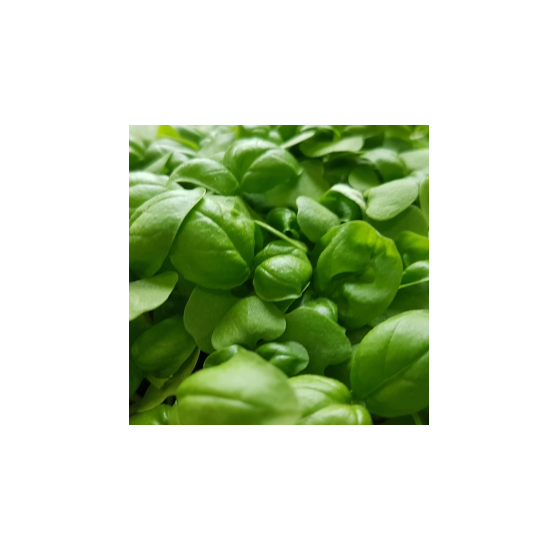Basil
50 g
Basil is rich in both culinary and nutritional values.
Here is a breakdown of the nutritional content of a ½ cup (21.20 grams) of basil:
- Vitamin K: 87.94 mcg (98 %DV)
- Manganese: 0.24 mg (12 %DV)
- Copper: 0.08 mg (9 %DV)
- Vitamin A: 55.91 mcg RAE (6 %DV)
- Vitamin C: 3.82 mg (5 %DV)
- Calcium: 37.52 mg (4 %DV)
- Iron: 0.67 mg (4% DV)
- Folate: 14.42 mcg (4% DV)
- Magnesium: 13.57 mg (3% DV)
- Omega-3 Fats: 0.07 g (3% DV)
Basil has other nutrients too, but in negligible amounts.
Did you know?
Basil is a culinary herb of the mint family (Lamiaceae). Although it is estimated that there are 50 to 150 species of basil, most, but not all, culinary basils are cultivars of O. basilicum, or sweet basil.
It is believed that basil has origins in India, but the herb has been cultivated for over 5,000 with its reach spreading to all corners of the globe.
Basil has long been used in culinary traditions, but its history is rich with other uses in society.
IIt was found in mummies in Egypt because the ancient Egyptians used this herb for embalming.
In Greece where it was known as basilikon phuton, meaning magnificent, royal, or kingly herb and was a symbol of mourning.
Basil also has a strong history in ancient traditional medicines like Ayurveda, the traditional medicinal system of ancient India, in addition to other medicinal herbal traditions.
It was used as an antidote for snake bites and was believed to give strength during religious fasting.
Basil can be added in small amounts to regular sprouting seeds (alfalfa, lentils, etc.) in a jar or sprouter. Mix the basil in after soaking the other seed. Do not soak the basil. Do not add to much, as basil tends to be gelatinous.
- Do not soak seed.
- Dampen an unglazed clay pot bottom or tray lined with Baby Blanket, unbleached paper towel or coffee filter, or soil.
- Sprinkle lightly with dry seeds, leaving space between the seeds.
- Spray lightly with water until damp but not too wet. Preserve moisture by loosely covering the seeds with clear plastic.
- Spray lightly with water twice a day. Keep damp, but not too wet. When established, sprouts can be rinsed under a slow flowing tap.
- ENJOY! Ready in approximately 14 days (microgreens).
Info: Did you know that sprouted seeds have between 4 to 40 times more nutrients than their mature counterparts? (1)
1. Xiao Z, Lester GE, Luo Y, Wang Q. Assessment of vitamin and carotenoid concentrations of emerging food products: edible microgreens. J Agric Food Chem. 2012 Aug 8; 60 (31): 7644-51. doi: 10.1021 / jf300459b. Epub 2012 Jul 30. PMID: 22812633 https://pubmed.ncbi.nlm.nih.gov/22812633/


